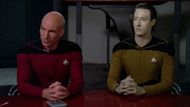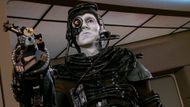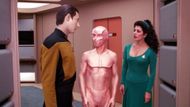Star Trek: The Next Generation is a sci-fi legend at this point, not just because it had cool starships and aliens, but because it made you think about really big questions. It ran from 1987 to 1994, picking up almost a hundred years after the OG series. This time, you’re cruising through the galaxy on the Enterprise-D with Captain Picard at the helm, trying to keep the peace and not get vaporized by some cosmic god.
What always hit about Star Trek: The Next Generation wasn’t just the space adventures, but how much it tried to be about figuring out what it means to be human. Sure, you get the classic line about “to explore strange new worlds, to seek out new life and new civilizations, to boldly go where no one has gone before”, but it was never just about the warp drives and phasers. Half the time, they’re dealing with bizarre new life forms or caught up in intergalactic politics.
And sometimes, the real drama isn’t out in space—it’s inside the crew’s heads.
The whole saga kicks off with the Enterprise being dragged into court by Q, this all-powerful troll who loves to mess with humans. He’s challenging their worthiness to exist.
Q pops back up in the series finale, too, just to remind everyone that the big questions never really go away. And while the crew’s got their hands full with the Borg ( nightmare robot zombies who want to turn you into one of them) or figuring out if they can trust the Klingons this week, the Romulans are always lurking, ready to stir up trouble.
The coolest bit is that every episode feels like its own little ethical mind-bender. The Prime Directive— Starfleet’s “don’t mess with other cultures” law—keeps popping up, but they break or bend it all the time. Nothing’s straightforward. The crew’s decisions stick with you, and Star Trek: The Next Generation doesn’t always tie up every dilemma with a neat little bow. Sometimes you just have to sit with the messiness.
People are still talking about Star Trek: The Next Generation. It’s not just nerdy fans, but actual scholars poking at the show’s ethical puzzles. Every episode could double as a philosophy class, with the crew wrestling over what’s right and wrong.
And the writers didn’t shy away from leaving things unresolved—sometimes there’s no perfect answer, and that’s kind of the point.
So here’s the game plan: we’re diving into five of the moral messes Star Trek: The Next Generation ever threw at us.
Moral Dilemmas in Star Trek: The Next Generation
The Measure of a Man: Data’s personhood and the rights of artificial life

If you’re talking about moral quandaries in Star Trek: The Next Generation, The Measure of a Man is the one everyone brings up all the time. The Data-on-trial thing is the peak sci-fi drama. They drag Data into court to determine whether he is Starfleet property or a sentient being with rights. Since he is an android, the discussion is whether artificial life can have autonomy and personhood.
This episode pops up in academic discussions. It’s like catnip for anyone obsessed with AI, consciousness, and what it even means to be “human.” Folks love pointing out how Data’s courtroom showdown isn’t just sci-fi drama—it’s a stand-in for the whole debate over AI rights and how we treat things that aren’t technically “alive” but maybe kinda are?
There are no easy answers in this episode, just a bunch of uncomfortable questions about souls, sentience, and whether we’re all just fancy machines.
And let’s not forget that courtroom showdown. Picard goes full lawyer mode, defending Data’s autonomy. It’s messy, it’s emotional, and it’s still super relevant because we’re all low-key terrified of our tech getting smarter than us.
If you want a Star Trek: The Next Generation episode that’ll mess with your head and make you question what it means to be “real,” this is the one.
The Prime Directive: Non-interference vs. moral responsibility

The Prime Directive, also known as General Order 1, is a significant Starfleet rule that has sparked numerous debates. Basically, it’s the “Don’t mess with other cultures” commandment. The idea is to keep Starfleet from stomping all over alien societies. While it sounds noble on paper, in practice, it is a total headache.
Take, for example, Who Watches the Watchers. The crew accidentally blows their cover, and a bunch of proto-Vulcans think Picard is a god.
Or Pen Pals, where Data starts chatting up a lonely kid on a dying planet—next thing you know, the crew has to decide if saving a kid’s planet is worth breaking the rules.
Academic analyses have highlighted the Prime Directive as some deep metaphor for the UN or colonialism, or the limits of cultural relativism. Is it about respecting other cultures, or is it just an excuse to do nothing when things get ugly? Depends on who you ask. Either way, it keeps fans arguing.
I, Borg: Individuality and the ethics of genocide

The episode I, Borg, throws you for a loop. So here’s this Borg drone—later named Hugh—who gets pulled away from the Collective and starts acting like a real person. Now, the crew has got a moral crisis on their hands: Should they use Hugh to nuke the entire Borg race (which is a borderline genocide)? Or do they treat him like an actual person and just let him go?
People bring this episode up in philosophy or ethics classes— is it cool to use someone as a tool, even if it’s for the “greater good”? It asks big questions: what happens when you dehumanize your enemy, what’s the actual worth of a single life, and how far you should go in a war without losing your own soul.
It hits home when you think about terrorism or how prisoners of war get treated.
Meanwhile, the crew’s final call is letting Hugh go, even though it could’ve been their chance to wipe out the Borg. That’s peak Star Trek: The Next Generation right there—nothing is ever black and white.
While fans are divided over whether they did the right thing, this episode is the poster child for showing how utilitarianism can get real murky, real fast.
The Drumhead: Witch hunts and the erosion of civil liberties

The Drumhead is a master class in how paranoia can turn even a chill workplace into a total circus. What starts off as a simple “Who broke the warp core?” turns into a full-blown witch hunt, all thanks to Admiral Satie. She drags everyone through the mud, grilling the crew.
And the whole thing is this huge nod to McCarthyism. You can practically see the Red Scare posters in the background.
We have got a gnarly tug-of-war between keeping people safe and not trampling all over their rights. It shifts from “let’s be careful” to a witch hunt real fast. Picard is constantly highlighting the defense of due process and individual rights, or simply asking them not to become space fascists.
It’s a slap in the face to anyone getting a bit too cozy with their shiny badge and power trip.
People who know their law and history have praised the episode. It nails how justice is kind of a glass vase—looks sturdy, but drop it in the wrong hands and it’s shattered.
The Offspring: Parental rights and the ethics of creation

The Offspring hits way harder than you’d expect from a show about space nerds and robots. Data builds himself a daughter—Lal—who ends up being more emotionally tuned in than Data ever was. She’s out here making connections, catching feelings, and then Starfleet swoops in trying to snatch her away for “research.”
Data has to throw down just to keep his kid.
The episode doesn’t just poke at the usual sci-fi stuff. It gets chaotic—creator rights, what it means to be a parent, and whether a synthetic person gets to control their own fate.
It’s not subtle, either; it’s kicking you in the feels about adoption, custody battles, and the whole “does the state own you if you’re different?” thing.
The Offspring is a homework for anyone who wants to argue about ethics and AI. Legal geeks and philosophers drag it into debates about robot rights and the nightmare of playing god with sentient beings.
And the ending is not neat or happy. You’re left sitting there, gutted, with way more questions than answers.
